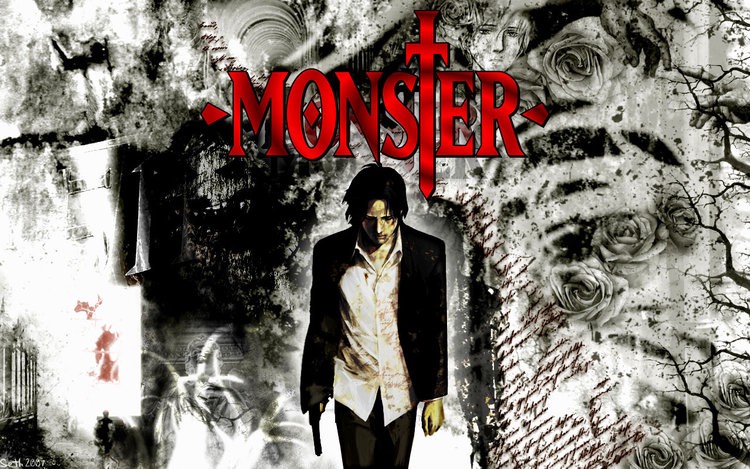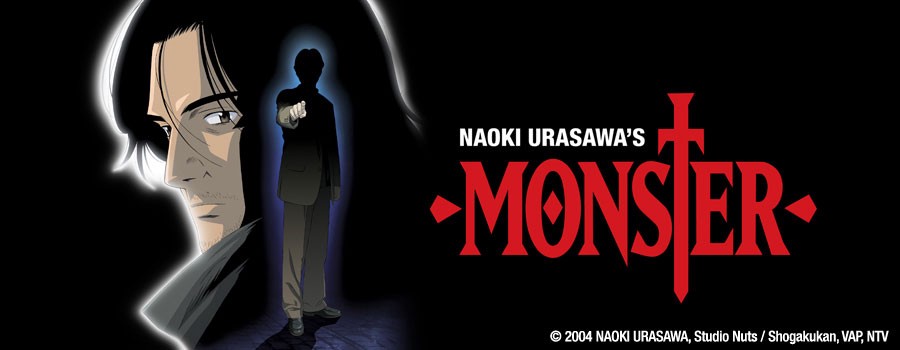Monster is a Japanese Animation (anime) adapted from the comic of the same name published from 1994 to 2001 by Naoki Urasawa.
It consists of 74 episodes, concluding its broadcast in 2004.

The background story:
Monster follows Dr. Kenzo Tenma, practicing in a hospital in Dusseldorf in the mid 1990s, after the fall of the Berlin Wall.
He operates on a young boy, Johan Liebert shot in the head by his twin sister Anna, against orders. This prevents him from attending to the city mayor, who subsequently dies under the operating table of a colleague. The twins were found with their adoptive parents murdered. He is demoted.
The twins disappear and his director and 2 senior colleagues are mysteriously murdered.
8 years later, now a successful and renowned head of surgery, Dr. Tenma pursues a fleeing patient, a bike thief named Junkers, to a construction site. Junkers is shot in cold blood by a now-youth Johan in front of the doctor. Traumatized, Dr. Tenma leaves his practice to track down the boy he saved 8 years ago.
Being 74 episodes, it uses its length leisurely. It is dense and follows several characters and their personal arcs. Each encounter of the doctor and other main characters are delineated episode-by-episode. This gives it a huge advantage over the 2?5 minute backstories seen in most of this medium and unique from the normal 100+ episode popular shows like Naruto and the 12?24 episode length of most TV broadcast anime.
Each character paints the background of the show. It explores, with almost scientific rigor, a cross-section of the different diaspora?s of post Berlin wall Germany. However, the characters themselves are often flat representations for their groups: the illegal migrants afraid of the government, the Turks in ghettos running trade shops, and (in the story) vicious Neo-Nazi?s ; they seem to have little individuality apart from how they are typically stereotyped. This point stays best after watching the series, with their names fading from memory and being remembered (by me) from their roles or appearances.
Doctor Tenma is driven and rational, with his only shortcoming being unable to grasp the true nature and aims of Johan. He is the engine through which the whole mystery unravels and a perfect foil to the antagonists. He and his allies rush around Europe to dissect the threads left behind 8 years ago and apprehend Johan.

The chase for Johan is mirrored by opening the lengthy, complicated origins of the twins. His character gains depth by not only his on-screen actions, but also with each new finding of the past. These findings tie into the larger issues of governmental control, psychological abuse and the ethical failings of individuals that the series delves into.
It has basic animation with a fitting soundtrack. However, it is not especially impressive or creative, drawn clearly with minimal details lending itself only to character interactions.
This series also does cater to the larger than life, science fiction or fantasy influences common in anime. There are almost-comic villain fantasies which are carried out through ruthless human-on-human violence. The most commendable being how the actions of the major antagonists carry a DNA thread of clinical violence carried forward seemingly from the Nazi gas chambers and the Holocaust as a whole, the topics of which lurk in the background.
Finally, the conclusion is somber, creative and extremely unsettling. Monster lives up-to its title by turning over the traits of empathy, kindness and a basic respect for human beings, and displaying the asocial side where ethics are not twisted, but absent, through its antagonists. A fitting story set in the setting sun of the Soviet seizure of Nazi Germany.
Length is the deciding factor to see Monster. It is a slow build that explores the background and each character and does not lend itself to a traditional adrenaline based-thriller but similar to a criminology case study.